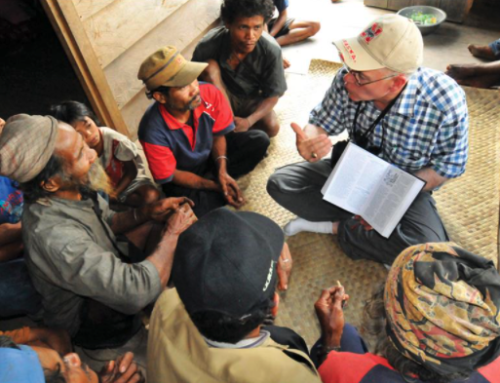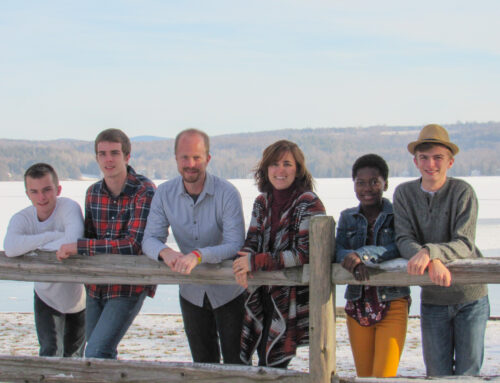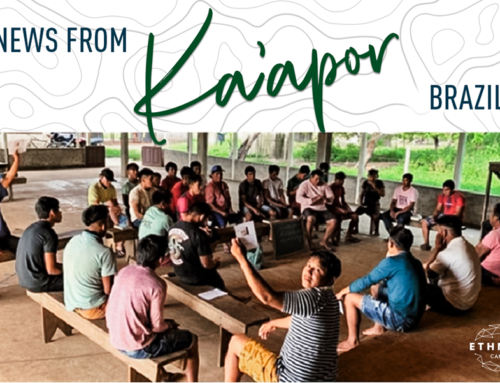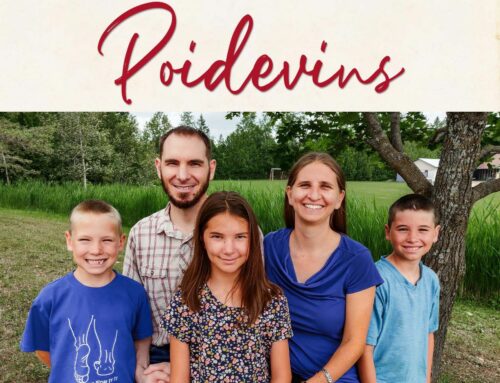The idea that God is everywhere all the time contradicts the beiliefs of Anton and his people that God is distant.
As missionary Porter Hampton tries to explain how big God really is, Anton begins to giggle and laugh.
Was he miscommunicating God’s eternal omnipresent power?
Then he remembered the last time he saw that in Anton. “We all went to the beach. He’d never seen the ocean before and culturally they are fearful of big water. At the beach he got almost drunk-like, giddy laughing and carrying on.”
The idea that God is everywhere all the time was contradicting Anton’s people’s belief that He is distant and just comes down to check on things. So his realization that God is here all the time and everywhere else too was so impacting with a healthy fear that he just had to giggle.
Porter reports that, “As we talked about the fact that God exists by His own power and has no need for anything that we have need of, Anton said, ‘If it’s like that then my thinking is that He created the world and food and all this stuff for us!’ While that point is made in a later lesson that we had not yet talked about, it was neat to see him reasoning things out like this.”
As the process of developing lessons progresses in Anton’s part of the world called Nagi land, there are plenty of interruptions that make it hard to keep going sometimes.
There was the airstrip in a nearby village that needed some work and then the big meeting with one of the head men, both very important but slow the flow of developing and checking the next lessons.
It doesn’t seem to matter how long Porter studies the language he is always surprised by how some things just seem impossible to say. If there are not words to express different ideas about time and when something is being or has been done, how would you say that the time had come to punish?
What about the Trinity? After spending lots of time trying to come up with their own way of explaining it in their session with Porter, he clarified that God would be the only one who can tell us the truth about it since He was there from the beginning, to which Yan responded, “Yeah! That’s the part I want to get to!”
Discussing creation starting with one man, they wondered about his colour and hair. And where did all these others come from?
Anton and Yan were quick to conclude that the trees and plants were created by God so that as they died it made great compost for their sweet potatoes. Porter says, “I almost laughed, but then realized that I haven’t mentioned that there was no sickness or death in the beginning.”
When it was taught that God created all the animals, the Nagi people were afraid that they were stealing God’s “stuff” by killing and eating plants and animals. They were relieved to remember that God had left man the responsibility over all He had created.
They were still concerned as to whether they were doing something they shouldn’t by realizing things weren’t the way God had intended.
Even the idea of being left responsible, Porter had to make sure what they understood by that. In Nagi when you give someone the responsibility for something it can mean that you leave the work for them. At some point it can mean to leave them or can be interpreted as being left behind.
So he asked, “Do you mean that God left the work for them to do or that he left the man and woman and went somewhere else?” To which Anton quickly replied, “No! God was still there. There is nowhere that God is not so he didn’t leave them!”
It’s something to praise God for that there is not a questioning as to whether God’s Word is true or not. They are remembering from lesson to lesson the important things that connect what God does with His character.
There is also a demonstration that as Anton and Yan work through these lessons with Porter they are interpreting new scripture by what they have already learned in previous lessons.
Let’s pray that these Nagi people continue to comprehend the truths of God’s Word with childlike faith that makes them giggle.
With this kind of progress and understanding we want to pray that the interruptions for Porter and his lesson planning and checking are few and far between.






